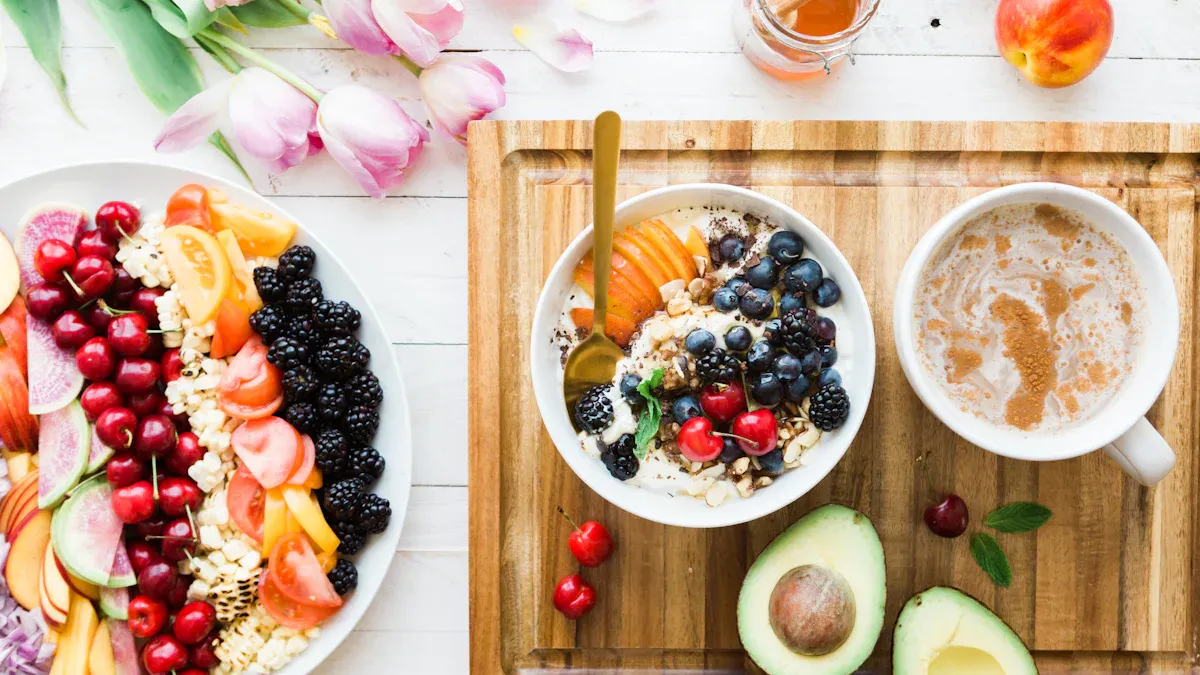How Diet Can Help You Recover After Cancer

Your diet plays a vital role in helping your body recover after cancer treatment, emphasizing the importance of "Nutrition for Recovery: The Role of Diet in Post-Cancer Healing." Proper nutrition rebuilds your strength, manages side effects, and supports healing. For example, a systematic review of clinical trials highlights that nutrition counseling prevents malnutrition and improves recovery outcomes. Another study found that patients receiving dietary interventions lived longer than those with standard care. By focusing on a recovery-focused diet, you can enhance your energy levels, strengthen your immune system, and improve your quality of life. This approach empowers you to take control of your healing journey.
Key Takeaways
Eating the right foods helps you get stronger after cancer.
Include healthy foods like lean meats, fruits, and veggies to heal and feel energetic.
Make meals ahead of time to have healthy food ready. This lowers stress and avoids bad food choices.
Drink lots of water and herbal teas. Stay away from sugary or caffeinated drinks.
Talk to a doctor or dietitian for advice on what to eat to recover better.
Nutrition for Recovery: The Role of Diet in Post-Cancer Healing

How Cancer Treatment Affects the Body
Appetite changes and taste alterations
Cancer treatments often affect your appetite and alter how food tastes. Chemotherapy and radiation can cause metallic or bitter flavors, making meals less enjoyable. You might also experience a reduced desire to eat, which can lead to unintentional weight loss. According to research, nearly 50% of cancer patients are at risk of malnutrition, with 12% already malnourished during treatment. These changes highlight the importance of focusing on nutrient-dense foods to meet your body's needs.
Fatigue and energy depletion
Cancer treatments can leave you feeling drained. Fatigue is one of the most common side effects, making it harder to stay active or prepare meals. Studies show that maintaining proper nutrition during and after treatment helps rebuild energy levels and prevents delays in recovery. A well-balanced diet provides the fuel your body needs to combat exhaustion and regain strength.
Digestive challenges and nausea
Nausea, vomiting, and other digestive issues often accompany cancer treatments. These symptoms can make eating a challenge. However, small, frequent meals and easily digestible foods can help you manage these side effects. Adequate nutrition reduces discomfort and supports your digestive system as it heals.
Why Nutrition is Vital for Healing
Strengthening the immune system
Your immune system plays a critical role in recovery. Proper nutrition boosts its ability to fight infections and repair damage caused by treatments. A diet rich in vitamins, minerals, and antioxidants strengthens your defenses, helping you recover faster.
Supporting tissue repair and cellular recovery
Cancer treatments can damage healthy cells and tissues. A balanced diet, especially one high in protein, aids in repairing this damage. Research emphasizes that adequate protein and calorie intake are essential for rebuilding tissue and regaining muscle mass after treatment.
Restoring physical and mental energy
Nutrition for Recovery: The Role of Diet in Post-Cancer Healing also involves restoring your energy levels. Foods rich in complex carbohydrates, healthy fats, and proteins provide sustained energy. This helps you feel better physically and mentally, improving your overall quality of life.
Managing Weight and Nutrition During Recovery
Strategies for Healthy Weight Gain
Choosing calorie-dense, nutrient-packed foods
If you need to gain weight during recovery, focus on foods that pack a lot of nutrients into small portions. Options like nuts, nut butter, and avocados provide healthy fats and calories. For example, a single handful of almonds contains about 170 calories, while one large avocado offers around 365 calories. Adding cheese, eggs, or red meats like beef and pork to your meals can also help. These foods are rich in protein and essential nutrients, supporting muscle repair and energy restoration. Including calorie-dense carbohydrates like rice, potatoes, and cereals topped with seeds or nut spreads can further boost your intake.
Eating smaller, frequent meals to boost intake
Eating smaller meals more often can make it easier to consume enough calories, especially if your appetite is low. Try dividing your daily intake into five or six smaller portions. Foods like rice, eggs, and potatoes are easy to digest and can be included in these meals. This approach ensures your body gets a steady supply of energy and nutrients throughout the day.
Approaches for Healthy Weight Loss
Prioritizing balanced, portion-controlled meals
If you aim to lose weight, focus on balanced meals with controlled portions. Include lean proteins, whole grains, and plenty of vegetables. Research, such as the Women’s Intervention Nutrition Study (WINS), shows that structured dietary plans can help cancer survivors lose weight and reduce cancer recurrence rates. This highlights the importance of intentional weight-loss strategies.
Avoiding processed and sugary foods
Cutting out processed snacks and sugary drinks can significantly improve your health. These foods often add empty calories without providing essential nutrients. Instead, choose whole, unprocessed options to support your recovery and maintain a healthy weight.
Maintaining a Balanced Diet
Incorporating fruits, vegetables, and whole grains
A balanced diet should include a variety of fruits, vegetables, and whole grains. These foods provide essential vitamins, minerals, and fiber. Studies show that adhering to plant-rich diets lowers mortality risks among cancer survivors. For example, whole grains and fresh produce can improve digestion and boost your immune system.
Reducing unhealthy fats and added sugars
Limit your intake of unhealthy fats and added sugars. Replace fried foods and sugary desserts with healthier alternatives like baked dishes and naturally sweet fruits. This adjustment not only supports weight management but also enhances your overall recovery.
Tip: Keep your meals colorful by including a variety of fruits and vegetables. This ensures you get a wide range of nutrients to aid your healing process.
The Importance of Protein in Recovery

Protein’s Role in Healing
Repairing muscles and tissues
Protein plays a key role in repairing muscles and tissues damaged during cancer treatment. Your body uses protein to rebuild cells and prevent muscle loss, which is common after treatment. A balanced diet with adequate protein intake ensures your muscles regain strength and function. The table below highlights how protein and other nutrients contribute to recovery:
Nutrient | Role in Recovery |
|---|---|
Protein | Used for repair of damaged tissues and prevention of muscle catabolism |
Antioxidants | Mediated gene expression of inflammatory cytokines after injury |
Probiotics | Improve immune system response in muscle repair |
Including enough protein in your meals helps you recover faster and reduces complications.
Enhancing immune function
Protein also strengthens your immune system. It supports the production of antibodies and immune cells, which protect your body from infections. Cancer treatments often weaken immunity, making you more vulnerable to illnesses. By consuming protein-rich foods, you give your immune system the tools it needs to heal and defend your body effectively.
Best Sources of Protein
Lean meats, fish, and poultry
Lean meats like chicken, turkey, and fish provide high-quality protein without excess fat. Fish such as salmon and tuna also contain omega-3 fatty acids, which reduce inflammation and promote healing. These options are easy to prepare and can be included in various meals.
Plant-based options like beans, lentils, and tofu
Plant-based proteins are excellent alternatives if you prefer non-meat options. Foods like beans, lentils, and tofu are rich in protein and fiber, supporting digestion and overall health. These options are versatile and can be added to soups, salads, or stir-fries.
Dairy products, eggs, and protein-rich snacks
Dairy products like yogurt, milk, and cheese offer protein along with calcium, which strengthens bones. Eggs are another convenient source of protein that can be cooked in many ways. High-protein snacks such as nuts, seeds, and protein bars are great for boosting your intake throughout the day.
Tip: A systematic review found that high-protein oral nutrition supplements significantly improved energy and protein intake, reducing complications in cancer patients. Including these supplements in your diet can enhance recovery outcomes.
By incorporating these protein sources into your meals, you can rebuild muscle, regain strength, and support your overall recovery.
Practical Tips for Maintaining Good Nutrition
Meal Planning and Preparation
Preparing meals in advance for convenience
Planning your meals ahead of time can make it easier to stick to a healthy diet. Preparing meals in advance saves time and ensures you always have nutritious options available. You can cook large batches of food and portion them into containers for the week. For example, preparing a pot of vegetable soup or a tray of roasted chicken and vegetables can provide multiple meals. This approach reduces stress and helps you avoid unhealthy, last-minute food choices.
Freezing healthy options for busy days
Freezing meals is another effective strategy. You can store soups, stews, or casseroles in freezer-safe containers for quick reheating. This method ensures you have access to balanced meals even on your busiest days. Foods like cooked grains, chopped vegetables, and lean proteins freeze well and retain their nutritional value. Labeling your containers with dates and contents helps you stay organized and prevents waste.
Staying Hydrated
Drinking water and herbal teas regularly
Staying hydrated is essential for recovery. Drinking water throughout the day keeps your body functioning properly and supports digestion. Herbal teas, such as chamomile or ginger, can provide hydration while soothing your stomach. Aim to drink at least 8 cups of fluids daily. Carrying a reusable water bottle makes it easier to track your intake and stay consistent.
Avoiding sugary and caffeinated beverages
Sugary drinks and caffeinated beverages can dehydrate you and add unnecessary calories. Instead, choose healthier alternatives like infused water with slices of lemon or cucumber. These options provide a refreshing taste without compromising your recovery goals.
Adding Nutrient-Dense Foods
Including superfoods like nuts, seeds, and berries
Superfoods are packed with nutrients that support healing. Nuts and seeds provide healthy fats, protein, and vitamins. Berries, such as blueberries and strawberries, are rich in antioxidants that protect your cells. Adding these foods to your meals or snacks boosts your nutrient intake. For example, sprinkle chia seeds on yogurt or add a handful of almonds to your oatmeal.
Associated Outcome | |
|---|---|
Rich in vegetables and fruits | Linked with lower risk of lung, oral, esophagus, stomach, and colon cancer |
Overall healthy dietary patterns (including legumes, whole grains) | Associated with longer overall survival after breast and prostate cancers |
Using herbs and spices to enhance flavor naturally
Herbs and spices not only improve the taste of your meals but also offer health benefits. Turmeric, for instance, contains curcumin, which has anti-inflammatory properties. Basil, oregano, and parsley add flavor while providing antioxidants. Using these natural seasonings reduces the need for salt and sugar, making your meals healthier and more enjoyable.
Tip: Experiment with different combinations of herbs and spices to discover flavors you love while supporting your recovery.
A recovery-focused diet plays a vital role in your healing journey after cancer treatment. By prioritizing protein, managing your weight, and adopting practical nutrition strategies, you can improve your recovery outcomes. Small, consistent changes in your eating habits lead to long-term health benefits and a better quality of life.
Note: Always consult your healthcare provider or a registered dietitian for personalized dietary advice tailored to your specific needs. Taking this step ensures you receive the best guidance for your recovery.
FAQ
What foods should you avoid during cancer recovery?
Avoid processed foods, sugary snacks, and fried items. These can hinder recovery and add empty calories. Instead, focus on whole, nutrient-dense options.
Tip: Read food labels to spot hidden sugars and unhealthy fats.
How much protein do you need daily after cancer treatment?
Your protein needs depend on your weight and activity level. A general guideline is 0.8–1.2 grams of protein per kilogram of body weight.
Note: Consult a dietitian for personalized recommendations.
Can you take supplements to boost recovery?
Supplements can help if you struggle to meet nutritional needs through food. However, always consult your doctor before starting any supplements.
Alert: Some supplements may interfere with medications or treatments.
How can you manage nausea while eating?
Eat small, frequent meals and choose bland, easy-to-digest foods like crackers or bananas. Ginger tea or peppermint can also help soothe nausea.
Tip: Avoid strong smells or spicy foods that might trigger discomfort.
Is hydration as important as food during recovery?
Yes, staying hydrated is crucial. Water supports digestion, regulates body temperature, and aids in nutrient absorption. Aim for at least 8 cups daily.
Emoji Reminder: 💧 Keep a water bottle handy to track your intake!
See Also
Recognizing Symptoms and Treatment Options for Duodenal Cancer
Identifying Key Symptoms Associated With Kidney Cancer
Exploring Symptoms and Causes Related to Anal Cancer
Key Symptoms to Watch for in Appendix Cancer
Essential Information on Symptoms of Adrenocortical Carcinoma

